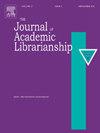Barriers to online library instruction in academic libraries: A qualitative study
IF 2.3
3区 管理学
Q2 INFORMATION SCIENCE & LIBRARY SCIENCE
引用次数: 0
Abstract
Online learning has greatly influenced higher education. In response many academic libraries have expanded their online instruction programs to improve information literacy in multiple learning environments. The barriers that limit the ability of academic librarians to deliver online instruction effectively are examined in this study, using semi-structured interviews with 18 participants who have considerable experience in academic librarianship and instructional design. Barriers are revealed, such as limited institutional support, resource constraints, pervasive negative attitudes toward both online learning as well as library instruction, insufficient student motivation, and inadequate professional preparation. These barriers signify longstanding issues—such as the undervaluation of librarians' educational roles and the lack of pedagogical training in library science curricula. However, changes in the higher education landscape, especially after the COVID-19 pandemic, have raised the urgency for planned responses. This research draws attention to the fact that, if the barriers that limit effective delivery of online instruction by academic librarians are going to be reduced, institutional investment has a key role; professional development opportunities need to be increased, and important curriculum in library science programs need to be reformed. Active advocacy that legitimizes and advances online library instruction will be an essential component of academic librarianship.
高校图书馆在线图书馆教学障碍的定性研究
在线学习极大地影响了高等教育。作为回应,许多学术图书馆扩大了他们的在线教学计划,以提高在多种学习环境中的信息素养。本研究通过对18位在学术图书馆工作和教学设计方面具有丰富经验的参与者进行半结构化访谈,考察了限制学术图书馆员有效提供在线教学能力的障碍。这些障碍包括机构支持有限、资源限制、对在线学习和图书馆教学普遍持消极态度、学生动机不足以及专业准备不足。这些障碍表明了长期存在的问题——比如对图书馆员教育角色的低估,以及图书馆学课程中缺乏教学培训。然而,高等教育格局的变化,特别是在2019冠状病毒病大流行之后,提高了制定计划应对措施的紧迫性。本研究提请注意这样一个事实,即如果要减少限制学术图书馆有效提供在线教学的障碍,机构投资将发挥关键作用;增加专业发展机会,改革图书馆学专业的重要课程设置。积极倡导在线图书馆教学的合法化和进步将是学术图书馆事业的重要组成部分。
本文章由计算机程序翻译,如有差异,请以英文原文为准。
求助全文
约1分钟内获得全文
求助全文
来源期刊

Journal of Academic Librarianship
INFORMATION SCIENCE & LIBRARY SCIENCE-
CiteScore
5.30
自引率
15.40%
发文量
120
审稿时长
29 days
期刊介绍:
The Journal of Academic Librarianship, an international and refereed journal, publishes articles that focus on problems and issues germane to college and university libraries. JAL provides a forum for authors to present research findings and, where applicable, their practical applications and significance; analyze policies, practices, issues, and trends; speculate about the future of academic librarianship; present analytical bibliographic essays and philosophical treatises. JAL also brings to the attention of its readers information about hundreds of new and recently published books in library and information science, management, scholarly communication, and higher education. JAL, in addition, covers management and discipline-based software and information policy developments.
 求助内容:
求助内容: 应助结果提醒方式:
应助结果提醒方式:


